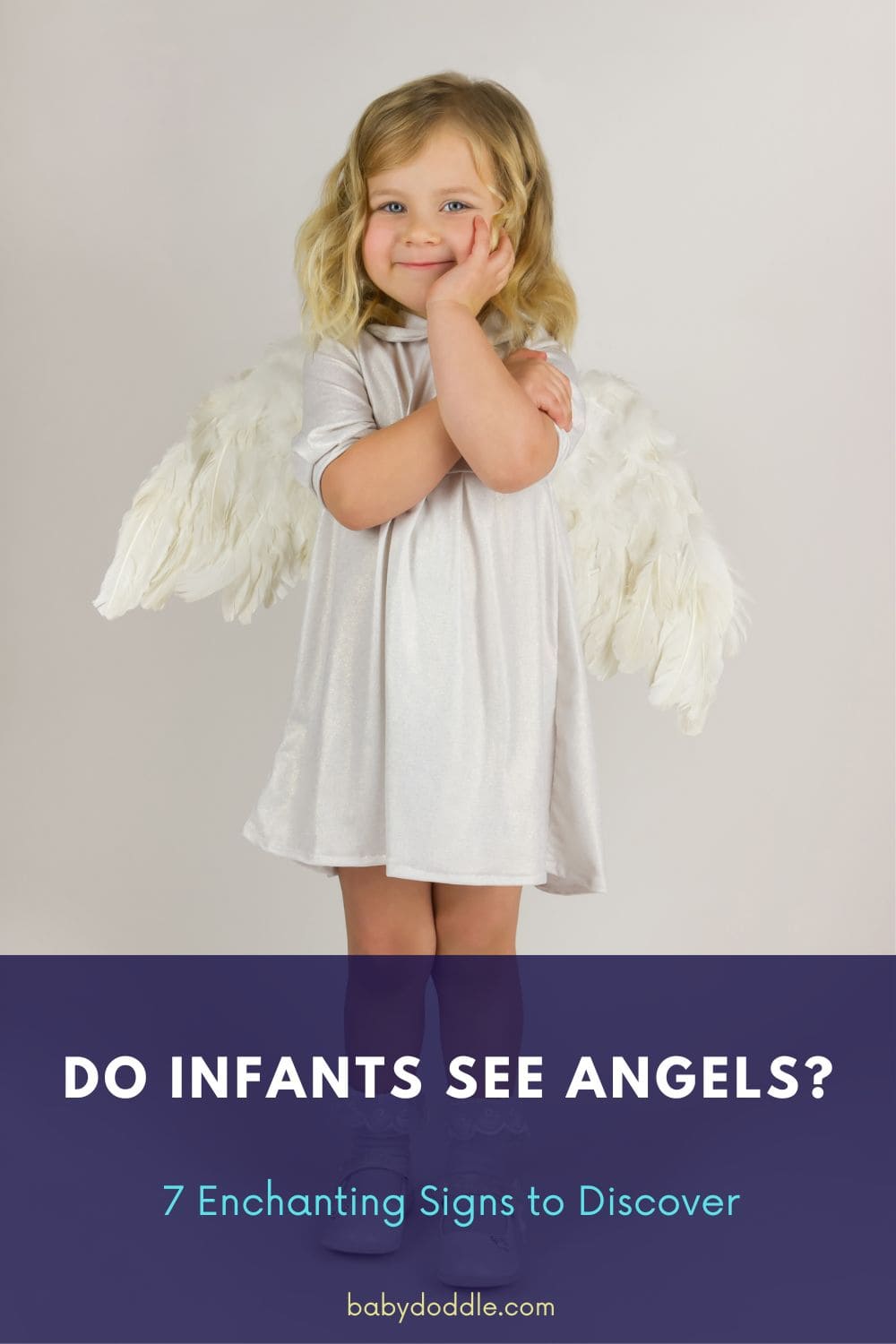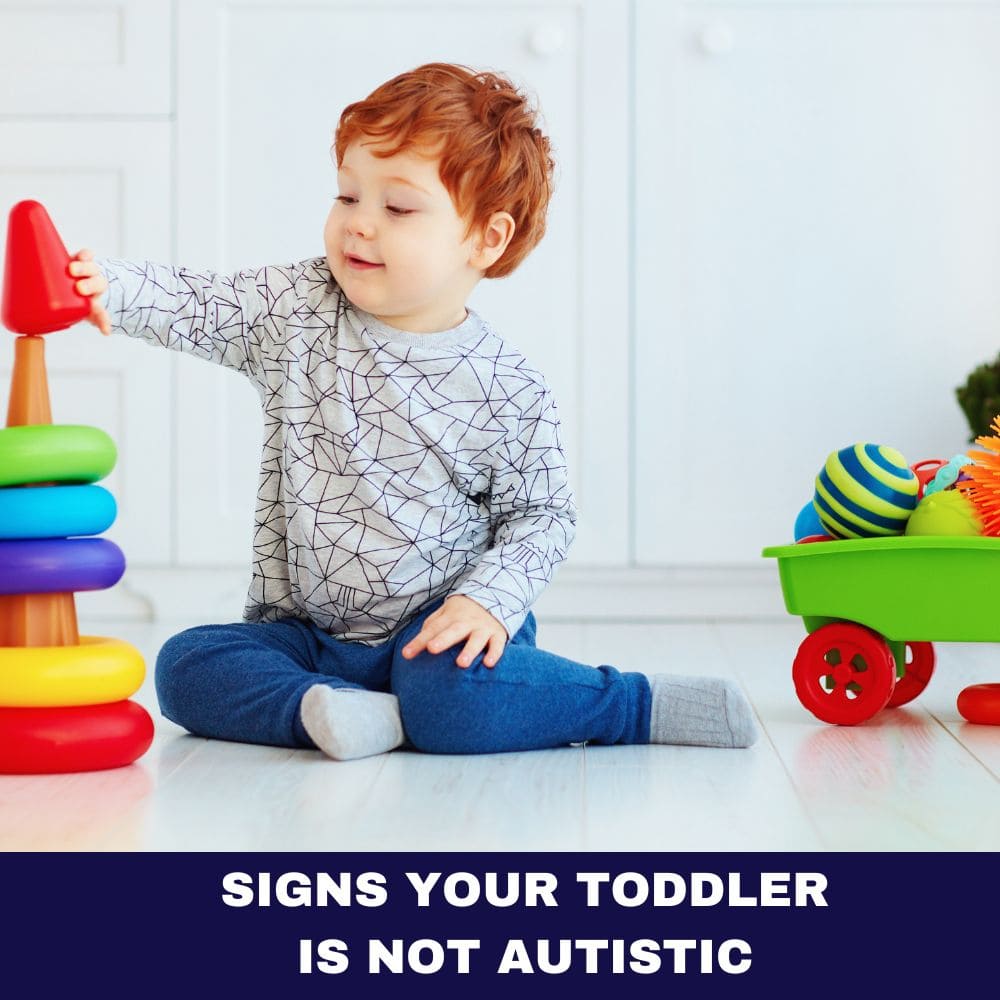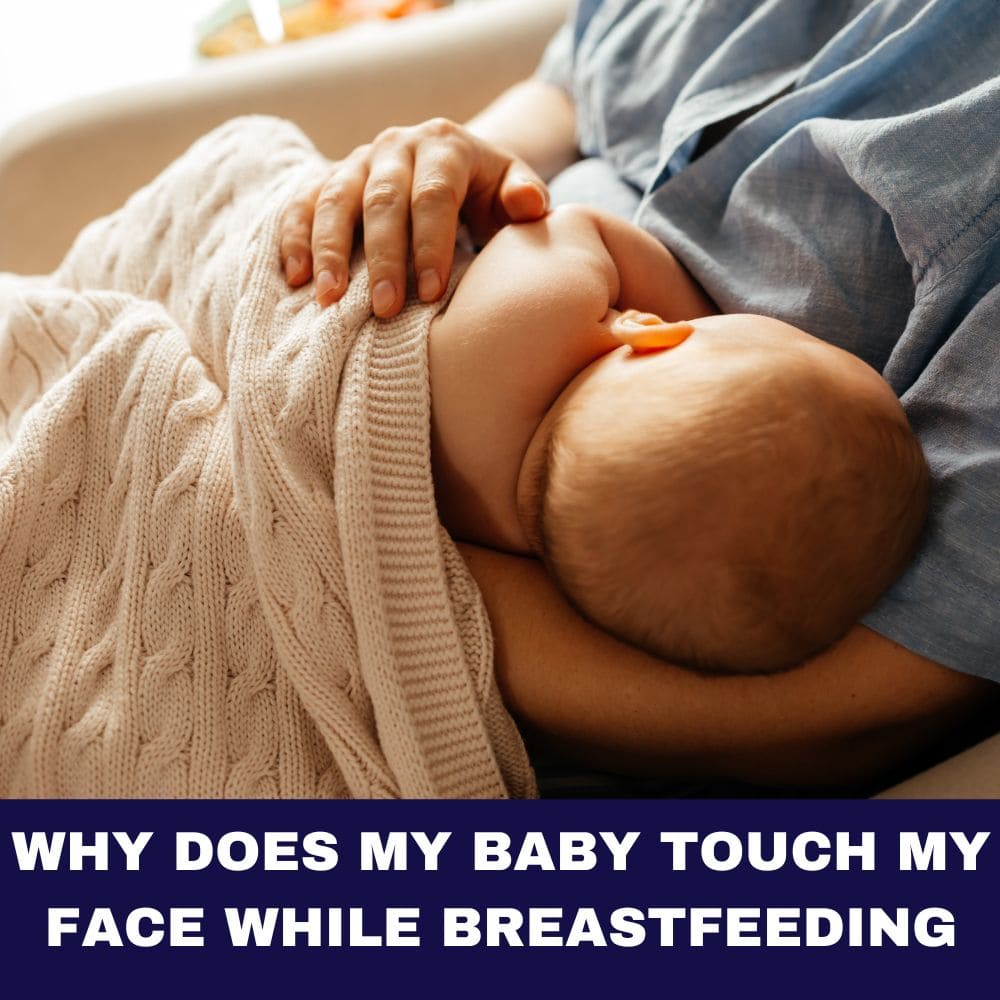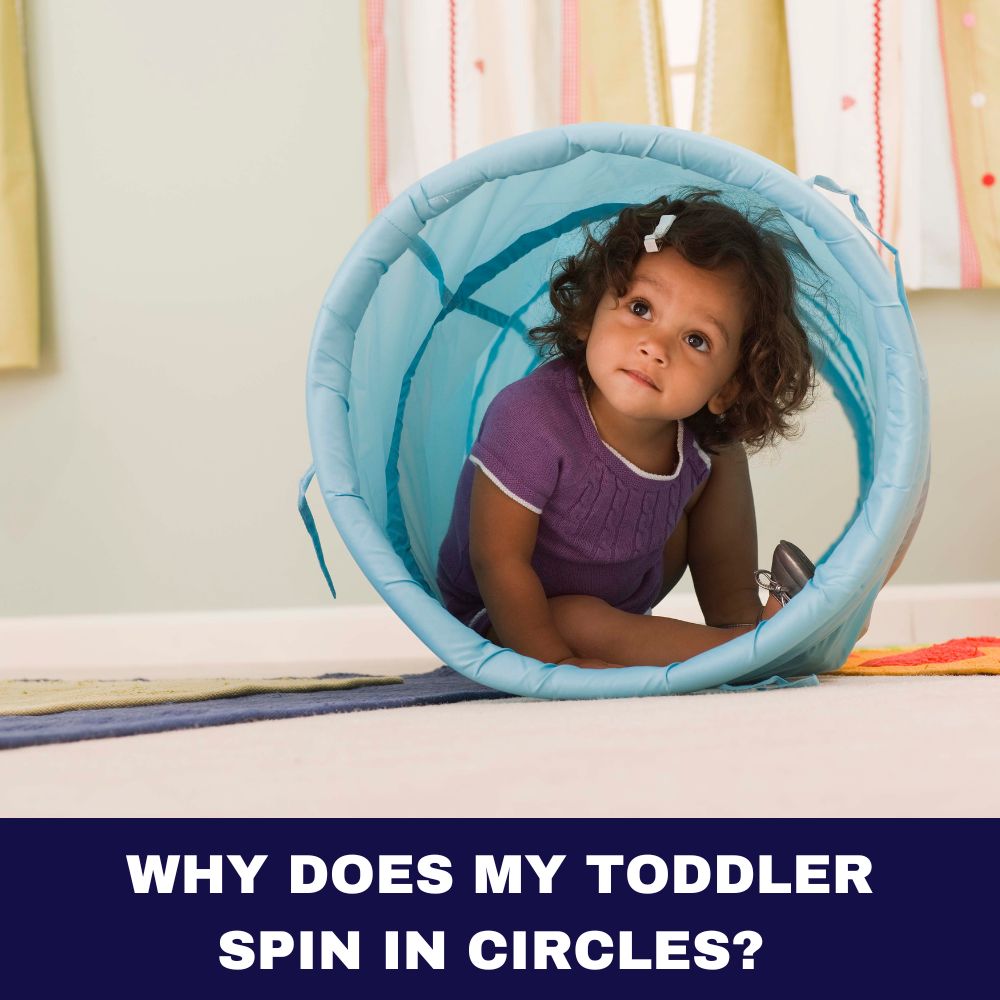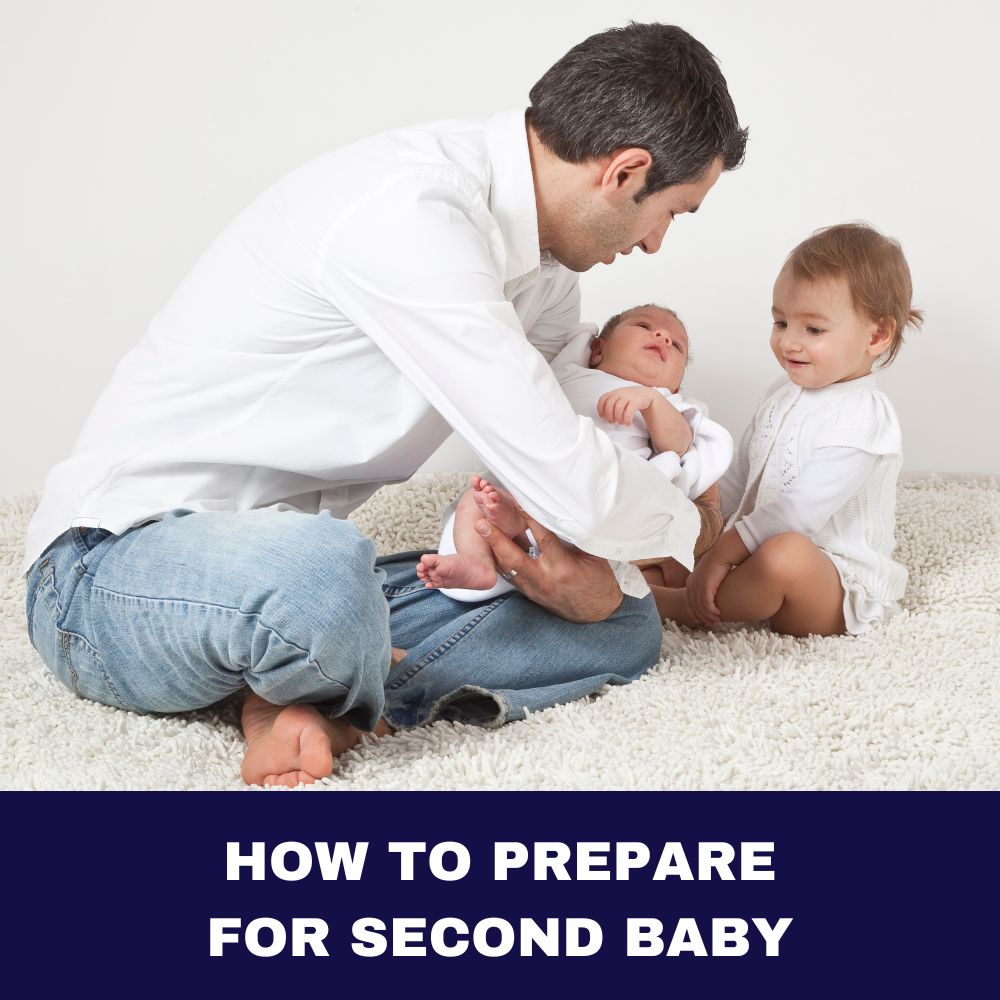Have you ever gazed into the wide, curious eyes of a newborn and wondered what miraculous sights they might be perceiving? The idea that infants can see angels – celestial beings from the spiritual realm – is a captivating notion that has intrigued parents, caregivers, and believers across cultures for centuries. While this phenomenon may seem otherworldly, numerous accounts suggest that these pure, innocent souls may possess a heightened awareness beyond our comprehension.
I vividly remember the first time I witnessed something extraordinary with my own infant daughter. One evening, as I nursed her to sleep, her eyes suddenly fixated on a corner of the room, and the most serene, beautiful smile spread across her face. She cooed and giggled, seemingly entranced by an unseen presence. Could it be that she was catching a glimpse of an angelic visitor? This experience left me both amazed and filled with wonder about the spiritual world’s mysteries.
So, can infants truly see angels? Let’s delve into this fascinating topic and explore the compelling signs that may indicate a profound connection between these precious beings and the celestial realm.
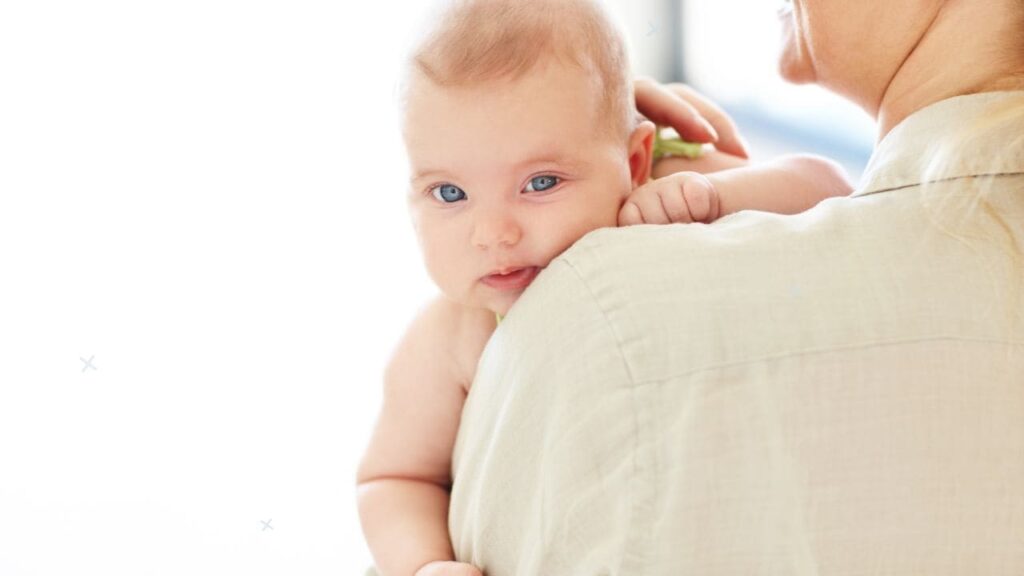
What are Angels?
Before we dive into the intriguing question of whether infants can perceive angels, let’s first understand what angels are traditionally believed to be. Across various religions and spiritual traditions, angels are revered as divine messengers, protectors, and intermediaries between the sacred and the mortal realms.
In Christianity, angels are depicted as powerful, benevolent entities created by God to serve as guardians and emissaries. The Bible is rich with accounts of angels appearing to deliver profound messages, offer guidance, and intervene in human affairs. From the Archangel Gabriel announcing the birth of Jesus to the Christmas story’s heavenly host proclaiming “Glory to God in the highest,” angels play a pivotal role in Christian theology.
Similarly, in Islam, angels are considered sublime beings created from light, tasked with carrying out God’s commands and serving as guardians over humanity. The Quran mentions several angels by name, including Gabriel (Jibril), the angel who revealed the holy scripture to the Prophet Muhammad.
In various other spiritual and cultural traditions, angels (or their equivalents) are revered as celestial messengers, guides, and protectors. From the winged deities of ancient Greek and Roman mythology to the cherubim and seraphim of Jewish mysticism, the concept of angelic beings transcends borders and belief systems.
Regardless of one’s religious or spiritual leanings, angels are often perceived as pure, radiant beings that embody divine love, wisdom, and protection. Their presence is believed to bring comfort, guidance, and a sense of connection to the sacred realm.
Can Infants Really See Angels?
The question of whether infants can truly see angels is a topic that has sparked both fascination and debate. While some dismiss the idea as mere fantasy, others firmly believe that these precious souls possess a unique ability to perceive the spiritual world in ways that elude most adults.
Those who believe that infants can see angels often point to the inherent purity and innocence of newborns. They argue that babies, having just emerged from the spiritual realm, may retain a heightened sensitivity and connection to the divine. Their souls, unencumbered by the weights and distractions of the material world, could be more attuned to the presence of celestial beings.
Proponents of this belief also cite numerous anecdotal accounts from parents and caregivers who have witnessed their infants exhibiting inexplicable behaviors, such as staring intently and smiling at seemingly empty spaces, reacting to sounds unheard by others, or displaying a sense of tranquility and contentment beyond their age.
On the other hand, skeptics attribute these perceived experiences to developmental factors and the boundless imagination of children. They argue that infants’ senses are still developing, and their perceptions may be influenced by their limited cognitive abilities and natural curiosity. Behaviors interpreted as interactions with angels could simply be responses to stimuli that adults cannot perceive or understand.
Despite the lack of scientific evidence, the belief that infants can see angels persists, offering comfort and solace to many. Whether one views it as a literal occurrence or a metaphorical representation of the innocence and wonder of childhood, the idea holds a profound allure and speaks to our innate desire to connect with the sacred.
Are Children More Likely to See Angels Than Adults?
Following the premise that infants possess a heightened sensitivity to the spiritual realm, some believe that children, in general, maybe more attuned to perceiving angelic presences than adults. This belief stems from the notion that as we age, our connection to the divine becomes obscured by the distractions and cynicism of the material world.
Proponents of this view argue that children’s innocence and openness to the world around them make them more receptive to the subtle energies and presences that adults may overlook or dismiss. Their minds are uncluttered by preconceptions, doubts, and the weight of life experiences, allowing them to perceive the world with a purity and clarity that fades as we grow older.
Furthermore, various spiritual teachings across cultures suggest that children have a natural affinity for the divine. In the Christian tradition, Jesus himself emphasized the importance of childlike faith, stating, “Truly I tell you, unless you change and become like little children, you will never enter the kingdom of heaven” (Matthew 18:3, NIV).
Similarly, in Buddhism, the concept of “beginner’s mind” is celebrated – the idea that approaching life with the wonder and curiosity of a child can lead to greater understanding and enlightenment.
However, it’s important to note that not all children may have experiences perceived as angelic encounters. Just as adults have varying levels of spiritual awareness and sensitivity, the same can be said for children. Some may be more attuned to the spiritual realm than others, influenced by factors such as temperament, upbringing, and personal experiences.
Ultimately, whether children are more likely to see angels than adults remains a matter of personal belief and interpretation. What is undeniable is the profound sense of wonder and awe that childhood can evoke, reminding us of the magic and mysteries that exist beyond our limited perceptions.
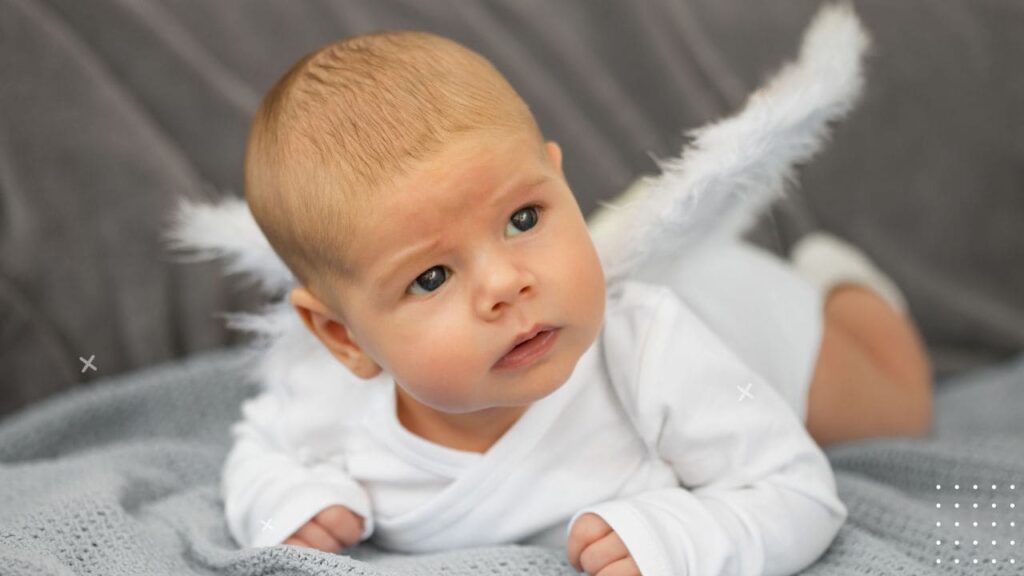
What Does The Bible Say About Infants Seeing Angels?
For those who follow the Christian faith, the Bible serves as a profound source of guidance and insight into the realm of angels and their interactions with humanity. While the scriptures do not explicitly state whether infants can see angels, some several accounts and teachings suggest a connection between children and these celestial beings.
One of the most notable passages is found in Matthew 18:10, where Jesus says, “See that you do not despise one of these little ones. For I tell you that their angels in heaven always see the face of my Father in heaven.” This verse implies that children are watched over by their own guardian angels, who have direct access to God’s presence.
Another significant account is the story of the Archangel Gabriel’s appearance to Mary, announcing the miraculous conception of Jesus (Luke 1:26-38). This event highlights the role of angels in the divine plan, particularly in relation to the birth and protection of the Messiah as an infant.
In the Old Testament, there are instances where angels intervened to protect and guide children. For example, in Genesis 21, an angel appears to Hagar and her son Ishmael, providing them with water and reassurance in the wilderness.
Moreover, the Bible often portrays children as being more receptive to spiritual truths and possessing a natural innocence that allows them to perceive the divine in ways that adults may struggle with. Jesus himself praised the faith and humility of children, stating, “Truly I tell you, unless you change and become like little children, you will never enter the kingdom of heaven” (Matthew 18:3, NIV).
While the Bible does not provide explicit confirmation that infants can see angels, these accounts and teachings suggest a unique connection between children and the spiritual realm. For many believers, this lends credence to the idea that infants may indeed be able to perceive the presence of celestial beings in ways that defy our limited understanding.
The Psychic Gift of Babies
Beyond religious and spiritual contexts, some believe that infants possess an innate psychic ability or heightened intuition that allows them to perceive the unseen realms, including the presence of angels or other spiritual entities.
This belief is rooted in the idea that babies are born with a natural sensitivity and openness to the world around them, unencumbered by the filters and preconceptions that adults develop over time. Their minds are like blank slates, allowing them to perceive reality in ways that transcend our limited senses and understanding.
Proponents of this viewpoint to instances where parents have observed their infants gazing intently and smiling at seemingly empty spaces or interacting with unseen entities through gestures and vocalizations. These behaviors are often interpreted as the babies communicating or engaging with spiritual presences, such as angels or loved ones who have passed on.
Additionally, some cultures and traditions embrace the concept of infants possessing a psychic gift or a “third eye” that allows them to perceive the supernatural realm. In certain indigenous practices, babies are believed to have a direct connection to the spirit world, and their intuitive experiences are respected and celebrated.
While the scientific community may be skeptical of such claims, those who believe in the psychic abilities of infants find solace and wonder in the idea that these precious beings can perceive dimensions beyond our physical reality.
It’s important to approach this topic with an open mind and respect for different belief systems. Whether one subscribes to the notion of infants possessing psychic gifts or not, the profound sense of awe and mystery surrounding these innocent souls remains a powerful testament to the depths of human experience and the wonders of the universe we inhabit.
7 Enchanting Signs That Infants May See Angels
Now, let’s explore the captivating signs that may indicate an infant’s ability to perceive angelic presence. While these behaviors can be interpreted in various ways, they have been reported by countless parents and caregivers across cultures and belief systems.
1. Gazing and Smiling at Unseen Entities
One of the most commonly reported signs is when infants appear fixated on a particular spot in a room, gazing intently and smiling or cooing at what seems to be an empty space. Their eyes may follow an invisible presence, and their expressions exude pure delight and wonder as if they are engaging with a beloved being.
Next step: If you notice your baby exhibiting this behavior, try to observe closely and note any patterns or specific locations where they seem most intrigued. You can gently narrate your observations and ask them (in a lighthearted manner) who or what they are seeing. Embrace the moment with a sense of curiosity and openness.
2. Reacting to Sounds Only They Can Hear
Another intriguing sign is when infants seem to react to sounds or voices that are inaudible to those around them. They may suddenly become alert, turn their heads in a particular direction, or respond with coos and babbles as if engaged in a conversation with an unseen entity.
Next step: If you witness this behavior, try to remain calm and observe your baby’s reactions closely. You can gently ask them (in a lighthearted manner) what they are hearing or who they are talking to. Embrace the moment with a sense of wonder and curiosity, even if you cannot perceive the sounds yourself.
3. Displaying a Sense of Calmness and Peace
Infants who exhibit an unexplained sense of serenity and contentment, even in situations that would typically cause distress, may be experiencing the soothing presence of angelic beings. Their demeanor exudes a profound sense of peace and tranquility that seems to transcend their age and circumstances.
Next step: If you notice your baby exhibiting this sense of calmness, try to create a peaceful environment around them. You can play soft, soothing music or engage in gentle activities that foster a sense of tranquility. Embrace the moment and allow your baby to bask in this state of serenity.
4. Making Gestures Toward the Air
Some infants have been observed reaching out, pointing, or waving their arms towards seemingly empty spaces, as if interacting with an unseen presence. These gestures may be accompanied by expressions of delight, curiosity, or even recognition, suggesting that they are engaging with a celestial being.
Next step: If you witness your baby making these gestures, try to observe closely and note any patterns or specific locations where they seem most engaged. You can gently narrate your observations and ask them (in a lighthearted manner) who or what they are interacting with. Embrace the moment with a sense of curiosity and openness.
5. Displaying Fear or Discomfort Without Apparent Cause
While angelic presences are often associated with positive emotions, some parents have reported instances where their infants suddenly display fear, discomfort, or distress without any apparent cause. This could potentially indicate a perception of negative spiritual entities or energies, which may be beyond our understanding.
Next step: If you notice your baby exhibiting these behaviors, try to provide a sense of comfort and security. You can hold them close, speak soothingly, or create a peaceful environment around them. If the behavior persists or causes significant distress, it may be worth consulting with a spiritual advisor or counselor who can provide guidance.

6. Exhibiting Fascination with Particular Spots or Areas
Infants may demonstrate a persistent fascination with specific locations or areas within a room, seemingly fixated on a particular spot for extended periods. This behavior could suggest a heightened awareness of angelic presences or energies concentrated in those areas.
Next step: If you notice your baby exhibiting this fascination, try to observe closely and note any patterns or specific locations where they seem most intrigued. You can gently narrate your observations and ask them (in a lighthearted manner) what they find so captivating about that particular spot.
7. Communicating Through Babbling and Cooing
Lastly, some parents have reported instances where their infants seem to engage in intricate babbling or cooing patterns as if communicating with an unseen entity. These vocalizations may follow a rhythmic or melodic pattern, suggesting a form of communication beyond our comprehension.
Next step: If you notice your baby exhibiting this behavior, try to observe closely and listen for any patterns or rhythms in their vocalizations. You can gently respond with your own coos and babbles, creating a playful and engaging interaction. Embrace the moment with a sense of wonder and curiosity.
It’s important to note that while these signs may be intriguing, they are not definitive proof of angelic presence. Each behavior can potentially have alternative explanations rooted in developmental stages, sensory integration, or the boundless imagination of childhood. However, for those who believe in the spiritual realm, these signs can hold profound significance and offer a glimpse into the mysteries that surround us.
| Sign | Description | Next Step |
|---|---|---|
| Gazing and Smiling at Unseen Entities | Infant appears fixated on a spot, gazing intently and smiling/cooing at seemingly empty spaces. | Observe closely, narrate observations, and ask the baby (lightheartedly) who or what they are seeing. |
| Reacting to Sounds Only They Can Hear | Infant suddenly becomes alert and responds to inaudible sounds or voices. | Remain calm, observe reactions closely, and gently ask the baby what they are hearing. |
| Displaying Calmness and Peace | Unexplained sense of serenity and contentment, even in distressing situations. | Create a peaceful environment, play soothing music, and allow the baby to bask in tranquility. |
| Making Gestures Towards the Air | Reaching, pointing, or waving at seemingly empty spaces as if interacting with an unseen presence. | Observe closely, note patterns, and gently ask the baby who or what they are interacting with. |
| Displaying Fear or Discomfort | Sudden fear, discomfort, or distress without apparent cause, potentially indicating negative spiritual presences. | Provide comfort, security, and create a peaceful environment. Consult a spiritual advisor if needed. |
| Exhibiting Fascination with Spots | Persistent fixation on specific locations or areas within a room. | Observe closely, note patterns, and gently ask the baby what captivates them about that spot. |
| Communicating Through Babbling/Cooing | Intricate babbling or cooing patterns, suggesting communication with an unseen entity. | Observe closely, listen for patterns or rhythms, and engage playfully with your own coos and babbles. |
The Innocence of Babies and the Purity of Angels
Across various cultures and belief systems, a common thread emerges – the idea that the innocence and purity of infants are intrinsically linked to their perceived ability to connect with the divine realm, including angelic beings.
Many traditions hold that babies, having recently emerged from the spiritual world, retain a profound connection to the sacred. Their souls are untainted by the weights and distractions of the material world, allowing them to exist in a state of grace and heightened awareness.
In Christianity, the concept of original innocence and the divine nature of childhood is deeply rooted. Jesus himself emphasized the importance of embracing the humility and purity of a child, stating, “Truly I tell you, unless you change and become like little children, you will never enter the kingdom of heaven” (Matthew 18:3, NIV).
Similarly, in Hinduism, the concept of “brahmacharya” – a state of spiritual purity and celibacy – is closely associated with childhood. It is believed that children possess an inherent connection to the divine, which fades as they age and become immersed in the material world.
Even in cultures without specific religious or spiritual beliefs, the innocence and wonder of childhood are celebrated and revered. There is a recognition that infants possess a unique ability to perceive the world with clarity and openness that adults often struggle to recapture.
This perceived connection between the innocence of babies and the purity of angels is a profound and comforting notion for many. It suggests that these precious beings are not only protected and guided by celestial entities but also possess an innate affinity for the sacred realm.
| Culture/Religion | Belief/Perspective |
|---|---|
| Christianity | Children are believed to possess original innocence and a divine nature. Jesus emphasized the importance of embracing childlike humility and purity to enter the kingdom of heaven. |
| Hinduism | The concept of “brahmacharya” (spiritual purity and celibacy) is closely associated with childhood. Children are seen as having an inherent connection to the divine. |
| Indigenous Traditions | Many indigenous cultures embrace the idea of infants possessing a “third eye” or psychic ability to perceive the supernatural realm. Their intuitive experiences are respected and celebrated. |
| General Cultural Beliefs | Across various cultures, the innocence and wonder of childhood are celebrated and revered, with a recognition that infants can perceive the world with a unique clarity and openness. |
Should We Believe Everything Infants “See”?
While the idea of infants perceiving angels is captivating, it’s important to approach the topic with a balanced perspective and a degree of healthy skepticism. Not every behavior or experience should be automatically attributed to supernatural causes.
Infants are still developing their senses and cognitive abilities, and their perceptions can be influenced by a variety of factors, both internal and external.
FAQ – Do Infants See Angels
What are the most common signs that an infant may be seeing angels?
Some of the most commonly reported signs that an infant may be perceiving angelic presences include:
- Gazing intently and smiling/cooing at seemingly empty spaces
- Reacting to sounds or voices that are inaudible to others
- Exhibiting an unexplained sense of calmness and serenity, even in distressing situations
- Making gestures like reaching, pointing, or waving towards the air as if interacting with an unseen entity
- Displaying sudden fear or discomfort without any apparent cause
- Exhibiting a persistent fascination with specific locations or areas within a room
- Engaging in intricate babbling or cooing patterns, suggesting communication with an unseen presence
While these behaviors can have alternative explanations, many parents and caregivers interpret them as signs of their infants perceiving angels or other spiritual entities.
Are there any scientific explanations for why infants might exhibit these behaviors?
While there is no scientific evidence to conclusively prove or disprove the idea of infants seeing angels, some scientific explanations for these behaviors include:
- Developmental factors: Infants’ senses and cognitive abilities are still developing, which can influence their perceptions and reactions.
- Sensory integration: Babies may be responding to stimuli that adults cannot perceive or understand due to their heightened sensory awareness.
- Object permanence: Infants are developing the understanding that objects continue to exist even when they cannot be seen, which could lead to behaviors interpreted as interactions with unseen entities.
- Imagination: Some experts attribute these behaviors to the boundless imagination and creativity of young children, which can manifest in various ways.
While these scientific explanations offer rational perspectives, they do not necessarily negate the possibility of spiritual or supernatural phenomena for those who hold such beliefs.
What do different religions and cultures believe about infants seeing angels?
Many religions and cultural traditions embrace the idea that infants possess a unique ability to perceive the spiritual realm, including angelic beings:
- Christianity: The Bible suggests that children have guardian angels and a pure, divine nature that allows them to connect with the spiritual realm.
- Hinduism: The concept of “brahmacharya” (spiritual purity) is associated with childhood, and children are seen as having an inherent connection to the divine.
- Indigenous traditions: Many indigenous cultures believe that infants possess a “third eye” or psychic ability to perceive the supernatural world, and their experiences are respected.
- General cultural beliefs: Across various cultures, the innocence and wonder of childhood are celebrated, with a recognition that infants can perceive the world with a unique clarity and openness.
These beliefs often stem from the idea that infants, having recently emerged from the spiritual realm, retain a heightened sensitivity and connection to the sacred.
Should parents be concerned if their infant exhibits signs of seeing angels?
In most cases, there is no need for concern if an infant exhibits behaviors that may be interpreted as seeing angels. These experiences are generally harmless and can be seen as a natural expression of a child’s curiosity, imagination, and potential spiritual awareness.
However, if the behaviors cause significant distress or discomfort for the infant, or if the parents have specific spiritual or cultural beliefs that require guidance, it may be beneficial to consult with a spiritual advisor, counselor, or trusted community member.
Ultimately, it is important for parents to approach these experiences with an open mind, respect their child’s perceptions, and create a nurturing environment that fosters spiritual growth and development, if aligned with their beliefs and values.
How can parents nurture their infant’s spiritual development if they believe their child can see angels?
For parents who believe their infant can perceive angelic presences or has a heightened spiritual awareness, there are several ways to nurture and support this aspect of their child’s development:
- Create a peaceful environment: Surround your infant with calming elements like soft music, gentle lighting, and natural elements to foster a sense of tranquility and spiritual connection.
- Engage in spiritual practices: Depending on your beliefs, you can incorporate practices like reading scripture, meditation, or prayer into your daily routine, allowing your infant to be exposed to these spiritual influences.
- Encourage intuitive expression: Provide opportunities for your infant to express themselves through creative outlets like art, music, or movement, which can facilitate spiritual exploration and connection.
- Seek guidance: If you belong to a particular faith or spiritual community, seek guidance from elders, leaders, or spiritual advisors on how to nurture your child’s spiritual growth in alignment with your beliefs.
- Remain open-minded: Embrace your infant’s experiences with curiosity and wonder, without judgment or preconceived notions. Their perceptions may offer valuable insights into the spiritual realm.
Remember, the most important aspect is to create a supportive and nurturing environment that respects your child’s unique experiences and aligns with your family’s spiritual or cultural values.
